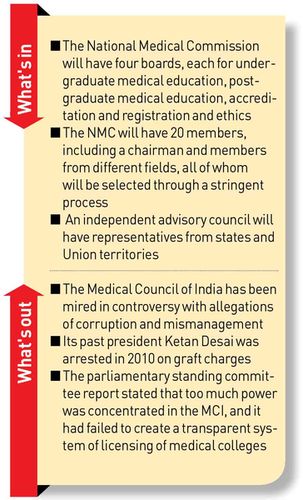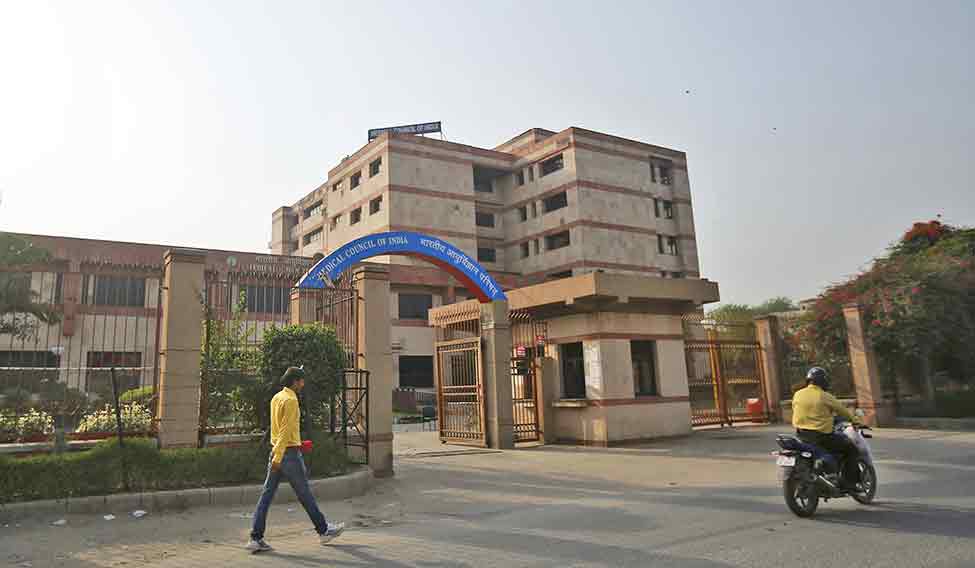The beleaguered and tainted Medical Council of India is in for a long-overdue overhaul. A four-member committee, formed by Prime Minister Narendra Modi, has proposed to replace the MCI with the National Medical Commission (NMC).
The committee consisted of Arvind Panagariya, vice chairman of Niti Aayog; Amitabh Kant, CEO, Niti Aayog; C.K. Mishra, additional secretary, health ministry; and P.K. Mishra, additional principal secretary, Prime Minister's Office. As per its recommendations, the NMC will have four boards, each to take care of undergraduate medical education, postgraduate education, accreditation of medical colleges, and registration and ethics. Each board will be autonomous and headed by a president, who will be an ex officio member of the commission. The aim is to revolutionise medical education in India.
The NMC will have 20 members, including a chairman. These members, unlike the MCI members who are elected, will be selected by a high-level search and selection committee. “The selection process of the members would be as stringent as the Union Public Service Commission exam,” said a senior Niti Aayog official. Around five members from different fields will also be part of the commission. There will also be an advisory council with representatives from states and Union territories.
“The Indian Medical Council Act, 1956 will have to be repealed to scrap the MCI and constitute the new body,” said the official. “To keep the new body corruption-free, there is a recommendation that all the existing staff of the MCI should be absorbed in other departments, but not in the new body.”
The MCI has been dogged by corruption for several years. Its president Ketan Desai was arrested in 2010 on graft charges. Many attempts were made to reform the MCI through legislative changes, but to no avail. For instance, replacement of the MCI with the National Commission for Human Resources in Health (NCHRH) has been in the cards since 2009. But the NCHRH Bill (2011) was rejected by the parliamentary standing committee on health in 2012, owing to lack of representation to states.

The parliamentary standing committee's report on the functioning of the MCI stated, “The committee is of the view that there is too much power concentrated in a single body [the MCI], and it has failed to create a transparent system of licensing of medical colleges. The MCI currently sets standards for recognition; inspects and licenses medical colleges; oversees registration and ethical conduct of doctors. It now proposes to undertake accreditation as well. Such concentration of powers creates a serious conflict of interest and provides a fertile ground for misuse of authority. The committee, therefore, favours bifurcation of the functions of the MCI and recommends that different structures be created for discharging different functions.”
In May this year, a Constitution bench of the Supreme Court, led by Justice A.R. Dave, formed a three-member committee under former chief justice R.M. Lodha to oversee the functioning of the MCI. The MCI, however, voiced its reservation against the decision and said vested interests had orchestrated a well-designed propaganda against the council to render it weak and toothless.
But changes are already under way in medical education. The government approved the National Eligibility cum Entrance Test to simplify admissions to medical colleges. The decision was taken to end the high capitation fee charged by private medical colleges. The postgraduate admissions, too, will follow a similar method of a single entrance test in December.
Besides, the government also plans to introduce an 'exit exam' for graduates. This will put pressure on medical colleges to improve the standard of education. There is a proposal to use the all-India postgraduate entrance for the exit exam and turn it into a three-in-one exam, which will also give medical graduates from foreign universities the licence to work.
“There is a need to overhaul the system to improve it. Otherwise it will be difficult to clean the rot, which is deep-rooted,” says Major General S.P. Jhingon, who took over as administrator of the MCI in 2001 for a year when Ketan Desai was sacked.
Former Union health secretary K. Sujatha Rao, however, said that it was the quality of the people appointed that mattered the most. “If the recent appointments to the National Board of Examination are an indication, then I am very afraid of the restructuring of the MCI,” she said. Also, a few MPs had opposed the scrapping of the MCI, asking the government to take full control of the body instead of replacing it with a new one.








